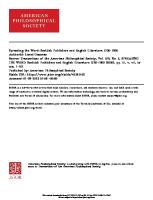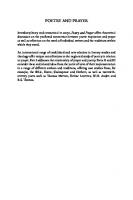Spreading the Word: Poetry and the Survival of Community in America 9780822398165
In 1985 poet Ross Talarico began a grassroots program in creative expression in Rochester, New York. As the program came
114 68 7MB
English Pages 168 Year 1995
Recommend Papers

- Author / Uploaded
- Ross Talarico
File loading please wait...
Citation preview
SPREADING THE WORD
Ross Talarico
s
p
REA D
DUKE UNIVERSITY PRESS Durham and London 1995
I
N
G
Poetry and the
T H
E
w o
R D
Survival
of Community In
America
© 1995 Duke University Press All rights reserved Printed in the United States on acid-free paper 00 Typeset in Minion by Keystone Typesetting, Inc. Library of Congress Cataloging-in-Publication Data appear on the last printed page of this book.
If you would learn to write, 'tis in the street you must learn it ... The people, and not the college, is the writer's home. -Ralph Waldo Emerson
CONTENTS
ix
Acknowledgments Introduction
xi
A Beginning of Sorts 1.
HARMONY
Workshop
10
1
3
The Understanding
22
2. THE DEMOCRACY OF LANGUAGE
25
Workshop 31 America's Pastime 43 3· DELITERACY
49
Workshop 57 Justice 66 4. THE ROLE OF THE POET
Workshop 87
73
Girls 96
5. TENNIS, POETRY, AND ALL THINGS SWEATY AND BEAUTIFUL
Workshop 114 Arrival
101
127
6. THE LANGUAGE OF A NEW AMERICA
Workshop 139 Finale
151
Departure
142
133
ACKNOWLEDGMENTS
F
;,st, I'd lik, to th'nk Rkk Padaro, my good friond, (0< hi< effom to convince a city government that a poet was worth listening to. Without his belief in literature and his interest in the written word, none of the literary efforts described in this book would have occurred. I'd like to thank Dan Hall, my editor at Gannett newspapers, for his consistent support in publishing essays and poetry that don't often appear on the pages of newspapers in this country. His interest in ideas gave many people, young and old, a chance to share their voices throughout my years in Rochester. I'd like to thank the many wonderful staff members of the City of Rochester's Department of Parks and Recreation, who, sometimes against the wishes of their supervisors, embraced poetry and creativity and literacy in order to facilitate the self-expressions of their constituencies. I'd like to thank, too, the City Council of the City of Rochester for its faithful support of the writing program in the face of numerous budget-cut crises. And finally, if I've given anything of myself over the last few years of encouraging others, or if I've instilled in others a sense of giving by a commitment to a process-writing poetry-that opens up hearts as well as minds, I'd like to thank, most of all, my mother, Regina Bird, for the simple, lifelong lessons of loving that she has always provided.
INTRODUCTION
A
fow oxpianatiom. This book cove" a tUne in my life when my position was quite unique-the only writer-in-residence for an entire city (Rochester, New York)-working under the mayor for city government, creating writing programs and literary events, projects and publications, for residents of all ages, skill levels, and backgrounds. That went on for eight years. I had established myself early in the world of poetry, published widely and becoming, like so many of the poets of my generation, a "university writer." But my life as a poet took on meaning when I left academia and discovered that the language of poetry was the language that sang to common people looking for access to selfexpression and self-revelation. This book is an effort, once and for all, to take poetry out of the hands of elitists and into the working vocabularies of the social arts. I use the term deliteracy several times in this text. The term is the title, in fact, of chapter 3. I coined the term to suggest something corporate and systematic that is going on in our country: the gradual disintegration of society's dependence on language. It may be useful for the reader to know the term before coming across it. Once in a while, I refer to this book as "a collection:' I imagine I do because this is such a collective effort-not one author's point of view, but more of a larger perspective based on the emotional, intellectual, and written responses of many. In addition, many of the individual
xii
INTRODUCTION
efforts that appear in this book first appeared in some collective effort: on community center Peg-Boards, on xeroxed sheets, in a city-wide anthology, on the walls of a museum, on TV and radio, in newspapers, on the stage in Chicago, and even in a Russian newspaper! The book is organized in an unusual way. Each chapter contains three sections: an essay on language that also serves to document the writing program and its creation in Rochester; a vignette that traces my own experiences that led to my compulsion to be a writer; and a "workshop" section which serves as a kind of biographical (as well as autobiographical) coda for each chapter. This last section gives the reader both a view of the more practical applications of my approaches to encouraging writing in others and a wider, more encompassing sense of how an entire community begins to enrich itself through the sharing of language arts. There is, I believe, a delicate structure in this format, one which implies strongly the connection between perspective, personal experience, and community enrichment, hopefully creating a sense of reverberation, experiences repeating themselves despite different environments-a notion essential to this book. Finally, I think of this book as a kind of entertainment and instruction. It is a reminder to writers. to artists in general. that they must work in new ways to make themselves available to a society in dire need of their sensibilities, techniques, and perspectives. It is, at the same time, an effort to communicate to a culture just how essential our poets and writers are in a world that is mistakenly perceived to be composed of strangers. Ross Talarico September 1994
A BEGINNING OF SORTS
~
L,re arecurring hnag' that haunts m" Oddly, it's an image of warmth, companionship, and yet it still has a haunting quality ... It is evening. It must be autumn because the last bonfire is beginning to flicker, the aroma of burnt leaves rising with the dreamlike smoke under the streetlamp. Saying goodnight to my teenage companions, I hop up the front steps and push open our front door (it is always left unlocked). There are lights burning inside the house as well-not flickering, not faint nor bluish, but steady, adequate, precise. Under them, illuminated: my sister Judy, knees up, snuggled up on the corner of the couch in the living room-in her hands, one of the books from the arched bookshelves on either side of the fireplace; and on the other side of the hallway, as I look beyond the darkened dining room and into the kitchen, my father there sitting at the table, sipping coffee and turning the pages of an Ellery Queen mystery. At the top of the stairs, I hear my mother running her bath, and taking a quick glance into Lonnie's room, my eldest sister, I see her writing something into a diary ... In my own room, I touch the cloth scapular that's wound around the bedpost before I lay my head back on the pillow. It's not that I'm religious-my father, in fact, is an atheist; but I am superstitious, respecting the simplest of routines, like repeating the exact same words to
2
A BEGINNING
my dog when I close the shed door on her in the cellar each evening, in order, I suspect, to make sure each day remains pretty much the same in my life, because I'm happy. I'm happy because I know each room in our little house is filled with life. I know within each room there's a private life unfolding, and that each maturing life gives depth to that stronger sense of belonging-a family. I know now, a quarter of a century later, the importance of that recurrent image. Because we had a sense of ourselves as individuals, we had each other as well. The image haunts me now, I believe, because it is one I cherish-and it is an image (I'm afraid) of the past.
1.
It's.
you
HARMONY
cold Febm.ry night in Rochester, New Yod" can f









